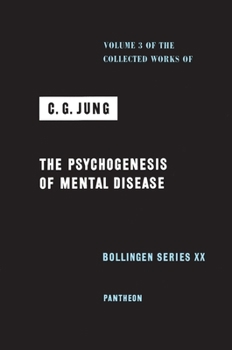Collected Works of C. G. Jung, Volume 3: The Psychogenesis of Mental Disease
(Book #3 in the Jung's Collected Works Series)
Select Format
Select Condition 
Book Overview
The authoritative edition of some of Jung's most important writings on psychiatry
Format:Hardcover
Language:English
ISBN:0691097690
ISBN13:9780691097695
Release Date:December 1960
Publisher:Princeton University Press
Length:320 Pages
Weight:1.60 lbs.
Dimensions:1.1" x 6.4" x 9.3"
Customer Reviews
3 ratings
MORE OF JUNG'S MOST IMPORTANT EARLY "PSYCHOANALYTIC" WRITINGS
Published by Thriftbooks.com User , 14 years ago
Jung states in the Foreword to his famous essay on Dementia Praecox, "This work is the fruit of three years' experimental researches and clinical observations... The important thing is that I should be able to show the reader how, through psychological investigation, I have been led to certain views which I think will provoke new and fruitful questions concerning the individual psychological basis of dementia praecox." Here are some representative quotations from the book: "Fairness to Freud, however, does not imply, as many fear, unqualified submission to a dogma; one can very well maintain an independent judgment. If I, for instance, acknowledge the complex mechanisms of dreams and hysteria, this does not mean that I attribute to the infantile sexual trauma the exclusive importance that Freud apparently does." (Pg. 3-4) "In men, sexuality, if not acted out directly, is frequently converted into a feverish professional activity or a passion for dangerous sports, etc., or into some learned hobby, such as a collecting mania." (PG. 49-50) "Psychological analysis is far from being able to explain in a clear and illuminating fashion all cases of the disease with which we are here concerned. On the contrary, the majority remain exceedingly obscure and difficult to understand, not least because only a fraction of the patients recover." (Pg. 170-171) "(A)bnormal people ... refuse to recognize the compensating influence which comes from the unconscious and even continue to emphasize their one-sidedness in accordance with the well-known psychological fact that ... the convert is the greatest fanatic; for I become a fanatic when I attack outwardly a thing which inwardly I am obliged to concede is right." (Pg. 207-208) "(I)t is well-nigh impossible to prove, even approximately, that schizophrenia is an organic disease to begin with. It is equally impossible to make its exclusively psychological origin evident." (Pg. 245) "It was this frequent reversion to archaic forms of association found in schizophrenia that first gave me the idea of an unconscious not consisting only of originally conscious contents that have got lost, but having a deeper layer of the same universal character as the mythological motifs which typify human fantasy in general... The term I chose for this, namely 'archetype,' therefore coincides with the biological concept of the 'pattern of behavior.'" (PG. 261)
Yesterday, today, & tomorrow
Published by Thriftbooks.com User , 18 years ago
Jung was a pioneer in the study of schizophrenia (formerly known as dementia praecox). My recollection is that Freud (who primarily addressed neuroses) was delighted to have depth psychology applied to schizophrenia--the term was invented by Jung's hospital supervisor Bleuler. Admittedly, this disorder is more difficult to treat with psychotherapy, but Jung believed that he made progress with it--p. 247 "Even if I am not very hopeful about a patient, I try to give him as much psychology as he can stand, because I have seen plenty of cases where the later attacks were less severe, and the prognosis was better, as a result of increased psychological understanding" & p. 267 "I have therefore made it a rule to give the intelligent patient as much psychological knowledge as he can stand. The more he knows in this respect, the better his whole prognosis will turn out; for if he is equipped with the necessary knowledge he can meet renewed irruptions of the unconscious with understanding and in this way assimilate the strange contents and integrate them into his conscious life." Today, there is a tendency for quick fixes. In medicine, this tends towards either surgery or drugs. However, one must consider the difference between treating symptoms vs. cure. Often both can be pursued simultaneously. I am unconvinced that making a patient drug-dependent for life is a "cure." If nothing else, this book is of interesting historical interest & since "what goes around comes around" (also known as the Pendulum Principle), the world of psychology may very well cycle around again towards a more balanced view vice nature vs. nurture. Jung makes some valuable statements herein worth quoting: p. 10 "There is no concept that has not had a one-sided and limited connotation forced upon it by some school or system," p. 28 (82ff) "in real life the logic of thought is nothing compared with the logic of feeling," p. 43 the whole aim of education is to implant lasting complexes in the child," & p. 207-8 "the convert [is] the greatest fanatic; for I become a fanatic when I attack outwardly a thing which inwardly I am obliged to concede is right."
The Psychogenesis of Mental Disease
Published by Thriftbooks.com User , 20 years ago
I have to disagree with Mr McGarry's review. Psychoanalysis is passe for treatment of Sz with good reason: it has zero positive impact. I have a good friend with Sz and introspective analysis is of no help, it's quite bad for him actually. It's all about pharmacology now. In that sense, yes, analysis is passe - very true. It doesn't help.However, for me, as a friend and sometimes caregiver (of sorts) for someone with schizophrenia, I find Jung's insight into Sz absolutely illuminating and original. Brilliant, wonderful, accurate. Completely unlike anything else under the sun. No one understands or describes mental disorder more clearly than Carl Jung. Since it is no longer fashionable or interesting to analyze schizophrenia, I doubt anyone will ever surpass Jung's contribution in this area. These books should never be allowed to go out of print.






